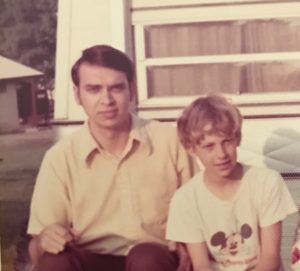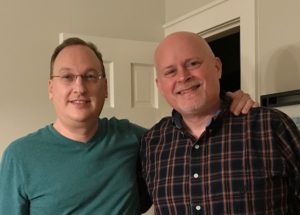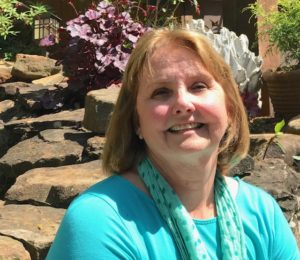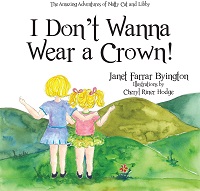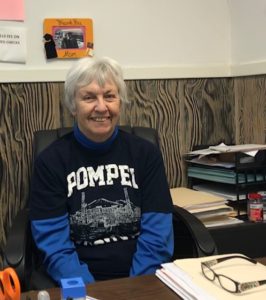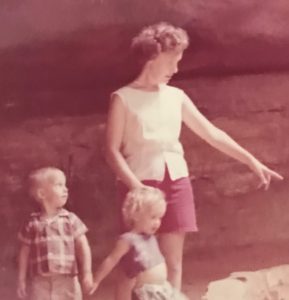
Mom has taken care of others her entire life.
I suspect it started as a girl, though obviously I wasn’t around to witness it. It was certainly true while I was growing up. She was a stay-at-home mom at a time when women were supposed to stay home and take care of their families. I was born nine months after Mom and Dad were married, and by their fourth anniversary they had three children, all preschoolers.
Mom changed every cloth diaper, made every meal, cleaned up our vomit when we couldn’t make it to our one bathroom and did everything she could to take care of all of us. The budget was tight, and she would make us a lot of Spaghetti-O’s, beans-and-franks, fried bologna sandwiches, and meatloaf with breadcrumbs. Fridays during Lent was fishsticks and tater tots.
Dessert was cinnamon and sugar on white bread and toasted in the oven. During the summer the cherry tree out back yielded tons of cherries and Mom would pit and bake the cherries into sour cherry pies. Christmas was nut cookies made with real lard. To this day, my favorite desserts are cinnamon pastries and sweet-sour desserts.
Once all of her kids were in elementary school, Mom wanted to work outside the home. Dad agreed so long as she’d be home by the time school let out. Mom had serious skills as a typist and stenographer. She knows shorthand, and I was always curious what she was writing because I couldn’t read it. (I wonder if younger generations even know what shorthand is?)
She got a job at the typing pool at an office near our elementary school. She found a good boss and actually followed him when he got hired at another company. Later, after we moved to Mississippi, she became executive secretary for the partners of the largest print shop in Jackson (maybe the largest in the entire state).
As a favor to Mom, one of the partners wrote a letter of recommendation to the local college encouraging them to offer a scholarship to me. The partner’s last name was Hederman—as in Hederman Science building and Hederman girls’ dorm on campus. I received a full tuition scholarship, which I’m sure helped my family greatly during a time when they had two or three children in college at once.
Mom almost always deferred to Dad’s judgment. I talked to Mom about it years later. She said that Dad was usually right, and that she did have disagreements with Dad, it was simply done behind closed doors and not in front of the children.
Frankly, I wish I had seen more of these disagreements. Mom modeled passivity to us children when it came to Dad. Dad may disagree, but I could have actually developed a better sense of entitlement as I was growing up. I think having a sense of my own voice and a better self-image would have helped me in my relationship with friends, adults, and others.
Yet—now that I think of it—both Mom and Dad supported me in my own interests. I always had a hobby that tended to change from year to year. I loved playing with a chemistry set and looking through a microscope I must have gotten for Christmas. As a teen, I created a photography darkroom in the basement. They tolerated me putting a huge CB radio antenna on the roof of the house.
Mom’s dad once let me look through a hoard of pennies to start my coin collection. I was hooked, and I collected anything you can imagine, and some things you might not imagine. They even let me collect beer cans even though Dad was against drinking alcohol.
I acted out as a teen. I was caught with a friend while we stole CB radios. I rationalized it because I wasn’t the person actually going into cars and doing the stealing. (The police told me afterward that who does the stealing makes no difference legally.) After the police brought me home, my mother and I just held each other and cried. Hurting her was probably one of the five hardest moments in my life. Mom, although it happened 40 years ago, it’s still not too much time to say how sorry I am.
Mom has always been devoted to Dad. She has supported his dreams. One of those dreams was to sell their house, buy a motor home and live in it full time. They did this for several years until Dad started to lose his eyesight.
Dad then wanted to build a home for her. She said she didn’t want a house, that she would be fine renting. He built the home anyway. Such is that way my parents love each other.
When Dad had his strokes, Mom visited the hospital for hours every day. She did this for many months. Dad has lost all of his memories of this, so we need to tell him what we witnessed. When she was home without him, she seemed lost. That was tough for her—not knowing if she’d ever get him back.
Mom was diagnosed with dementia a few years ago. She forgets more now. She’s lost some of her ability to take care of others. It’s time for others to take care of her. I wonder if that will be hard for her.
Dad regained his mind, but has lost the ability to do some things for himself physically. Mom is losing her memory, but still has the ability to do for my dad. So they make it work, and they still live independently at the home Dad built for her.
Everything I said at the end of Dad’s letter I can repeat here. Mom did the best with what she knew. She worked hard to make sure we were all taken care of under sometimes trying situations. That’s how she shows her love. And she loves us very much.
